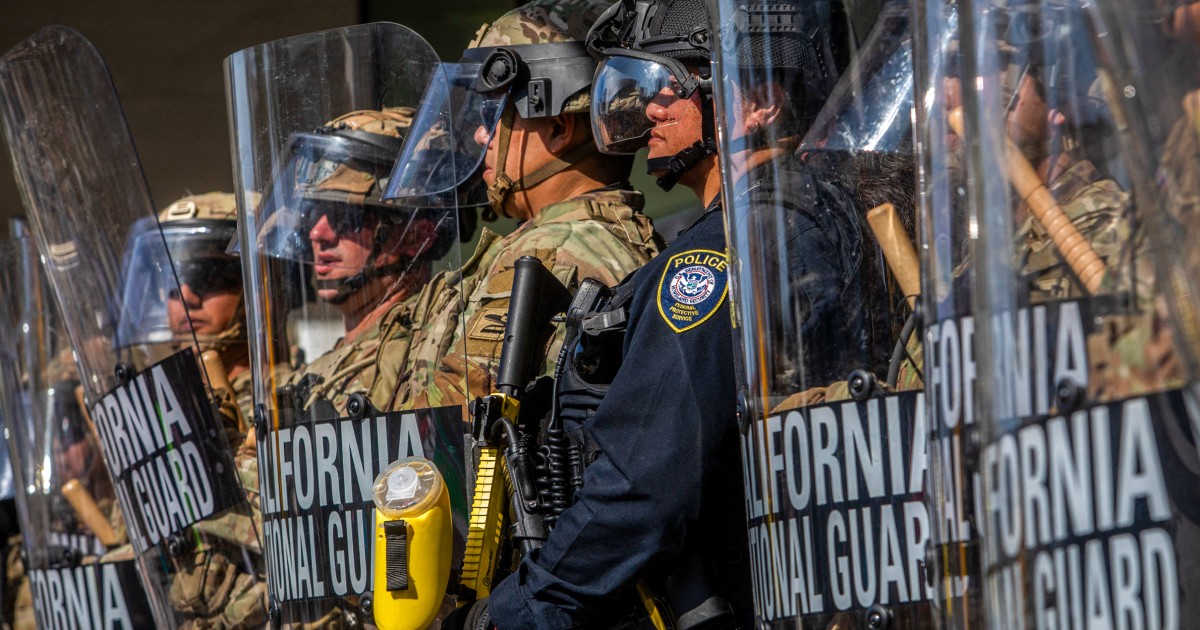Judge’s Landmark Ruling Against Military Deployment in California
Background of the Case
On a pivotal Tuesday in Los Angeles, a federal judge delivered a significant ruling that could reshape the boundary between state governance and federal military authority. U.S. District Judge Charles Breyer concluded that the Trump administration had violated the Posse Comitatus Act, a 19th-century law designed to limit the military’s role in domestic law enforcement. This ruling specifically addressed the deployment of approximately 4,000 National Guard troops and 700 Marines to Los Angeles in June, a move undertaken amid escalating protests against immigration policies.
The Court’s Findings
In a 52-page ruling, Judge Breyer articulated that the evidence presented showed systematic use of armed soldiers, often obscured by protective gear, for civilian law enforcement activities. He remarked, “Defendants systematically used armed soldiers… to set up protective perimeters and traffic blockades, engage in crowd control, and otherwise demonstrate a military presence.” This interpretation underscored Breyer’s determination that the administration’s actions were beyond the limits set by the Posse Comitatus Act.
Implications of the Ruling
The ruling represents a significant constraint on President Trump’s attempts to deploy military personnel for civilian policing purposes. Critics had previously labeled such actions as federal overreach, arguing that they encroached upon local authority and governance. Breyer’s decision reinforces the notion that military involvement in local law enforcement should be approached with caution and is only permissible under specific circumstances.
State Pushback against Federal Authority
The Trump administration positioned the military’s presence in Los Angeles as a necessary measure to protect federal property amidst what it described as violent riots. However, local officials, including California Governor Gavin Newsom and Los Angeles Mayor Karen Bass, argued that the protests were largely peaceful and that the local government was more than capable of maintaining order without federal intervention. Their opposition demonstrates a growing tension between state leadership and federal directives.
Legal and Political Responses
The ruling was met with mixed reactions. White House spokesperson Anna Kelly described the judge as a “rogue” attempting to undermine the President’s authority to protect American cities. Governor Newsom celebrated the ruling, emphasizing that no president could overwrite a state’s power to secure its residents’ safety. He noted, “No president is a king — not even Trump,” reinforcing the concept of checks and balances.
The Role of the Posse Comitatus Act
The Posse Comitatus Act, instituted in 1878, is a critical legal measure that prohibits the use of the military as a domestic police force without explicit Congressional approval. Judge Breyer’s ruling serves as a reminder of this longstanding restriction, addressing the potential consequences of utilizing military forces to enforce laws traditionally managed by civilian law enforcement agencies.
An Examination of Military Deployment
The judge’s ruling specifically restricts the Trump administration from using military personnel in California for activities such as arrests, searches, and crowd control unless a distinct law enforcement inability is proven. Breyer emphasized, “There was no rebellion, nor was civilian law enforcement unable to respond to the protests.” This ruling emphasizes the importance of maintaining a clear distinction between civilian law enforcement and military authority, an issue that has implications far beyond California.
Ongoing Military Presence and Future Consequences
Although several hundred National Guard troops remain in Los Angeles, their responsibilities must be aligned with the judge’s orders to adhere to the Posse Comitatus Act. The ruling also addresses fears that the President’s actions could lead to a national police force. Breyer indicated that the administration’s use of military personnel across cities would effectively place the military under the President’s command for domestic policing.
Community Impact
The military’s deployment had immediate implications for local communities. Tensions rose as military presence in various neighborhoods intensified fears around authority and governance. Spotted at immigration enforcement operations, such as those in MacArthur Park and cannabis cultivation centers, the military’s involvement sparked opposition from community leaders and advocates, further complicating the relationship between local residents and federal forces.
Testimonies and Court Proceedings
During the trial, testimonies from military leaders suggested that their deployment was framed as a protective measure. Maj. Gen. Scott Sherman indicated that orders from higher command authorized the troops to engage in various forms of support, including traffic and crowd control. However, these assertions were met with skepticism from Judge Breyer, who questioned the ambiguity surrounding those operational limits.
Conclusion of Court Proceedings
In an era marked by profound challenges to civil liberties and federal overreach, Judge Breyer’s ruling stands as a clarion call for protecting state sovereignty against potential abuses of executive power. The next steps for the Trump administration remain unclear as they navigate the complexities of compliance with the ruling amidst a heightened political climate. The outcome of this case not only impacts Los Angeles but could also set a precedent for how military forces are utilized across the United States in response to unrest and civil disobedience.



